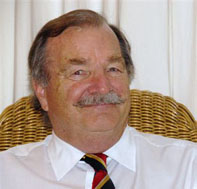The Second World War, which 70 years ago was going well for the Allies, was a good time to be a Boy Scout because, apart from helping with The War Effort (which included collecting any kind of waste with which to hit the Germans) there was also such a shortage of manpower that it meant Scouts were often called upon when a lot of hands were needed.
One grey November afternoon I heard, over the radio, that the Warwickshire police were seeking volunteers to search nearby Sutton Park – mostly a marshland – for a missing woman.
We marched to the police station and, as most of us wore studs in our shoes, we made quite an imperialistic noise. As we swung into the police station everybody looked up including Chief Inspector Victor Rex Cogbill who had been seconded to co-ordinate the hunt. It was, of course, a Boy Scout’s duty to ‘serve God and the King’ and we instinctively recognised that the Inspector represented both.
But there was a distinct raising of the eyes when our village constable saw us. He towered above us, which was not difficult. He knew us collectively and individually and suggested to the Inspector that it would not be wise to have Boy Scouts wandering around the moors, especially as it was near dusk, and especially as the missing woman might have been murdered.
Murdered!
Now we were really keen. We all began tugging at the Inspector’s sleeve. He then nodded to the Constable who, with undisguised reluctance, allocated us a sector of the park which was particularly soggy.
We carried our patrol whistle which had a pea in it and we were told to blow it loudly if we saw or found anything.
We walked through strings of cold mist, down into the dale, singing patriotic songs in deep voices in the hope that if the murderer was around he would think the Eighth Army was bearing down. Although the sun was still two hours from setting the afternoon was gloomy and foreboding. Soon we were shivering and up to our ankles in black ooze.
Our voices trailed off and we lapsed into a silence. It was then we became aware of the distant baying of bloodhounds and our hair stood on end despite the weight of Brylcreem.
As it grew dark we closed up.
Each of us carried a scout staff, a long pole made from ash which Boy Scouts use for vaulting streams and building arch bridges similar to the Sydney Harbour Bridge. None of us had really mastered the art even of vaulting streams but we never gave up trying. As we advanced into the swamp I let Vincent Laidlaw go in front because, well, first it was good to give everybody a go at leading, and second, he had a bayonet lashed to his staff.
Darkness fell.
We were frequently sinking up to our knees in mud and were keeping so close together we kept standing on each other’s feet – except Arbuckle whose enormous feet enabled him to walk on the surface.
Somebody said ‘What if we run into the murderer?’ We closed up even tighter. It now became impossible to move in any direction. I decided to blow on the whistle but the pea kept popping out.
Late that night a huge spotlight that should have attracted enemy bombers from as far away as Schleswig Holstein began sweeping the marsh and it finally settled on us. There were dogs and voices and, in the white glare, some agitated mother-looking figures. A loudhailer said ‘Walk this way!’
We then learned that the missing women had been at a cinema. In those days you could sit there all day for a shilling.
The police had spent the evening looking for us.
There towered Constable Cope, his eyes raised up into his forehead so they gleamed like a pair of hard boiled eggs.
(Adapted from The Yellow Six – available via Amazon (kindle) and Smashwords.
Filed under: Uncategorized |





Leave a comment